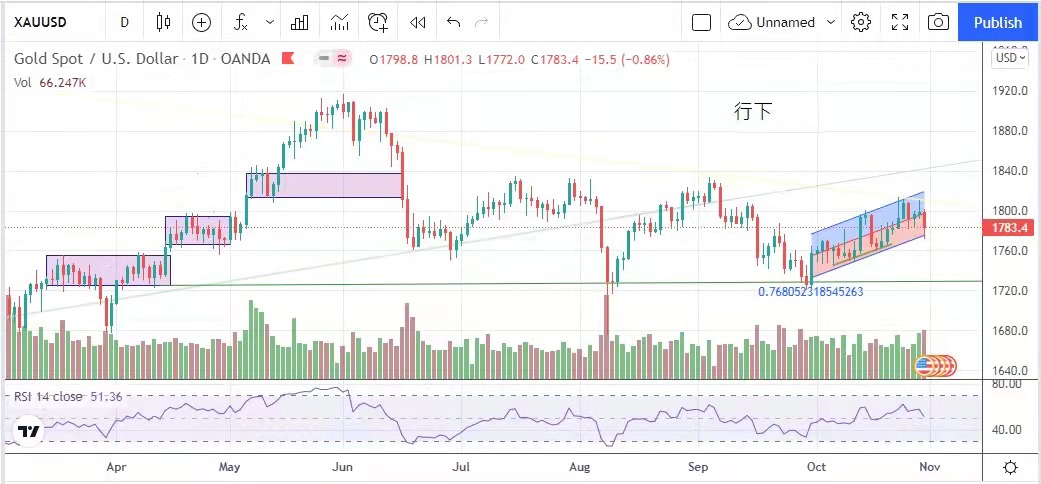American stock news.
On November 1st.
Today's volatility range:
Bottle neck in global supply chain, pushing up inflation. Inflation has already exceeded the 2% set by the Federal Reserve Board. In recent weeks, the number of new initial jobless claims has dropped again, breaking the post-epidemic record for three consecutive weeks.
It shows that the labor force has steadily rebounded, and the two factors of the Fed's delisting have been gradually met. Coupled with the pressure from other central banks, the Fed will knock on its own board on the interest rate meeting next week. The Fed's contraction will depress the gold market.
This week is Super Data Week. There are both non-agricultural data, the interest rate decision result of the Federal Reserve and the statement after the meeting. The market will be more turbulent. It is expected to break through this week and test the support of USD 1,766 and USD 1,754.
Today, it is suggested that the volatility should remain at 1770-1788 US dollars.
The turmoil of default by mainland real estate enterprises has been falling one after another. Evergrande unexpectedly paid another overdue interest last week, but one more real estate company in the market was involved in debt default. The Chinese government has made a series of moves to help the poor under the policy of common prosperity.
Whether it can be lifted out of poverty is still unknown, but the assets of the rich have been lowered first. According to the Hurun Rich List in the Mainland, the online media tycoons in the Mainland, Shuangma: Ma Huateng and Ma Yun, have shrunk dramatically, falling by 20% and 35% respectively.
Top three positions. The People's Bank of China continued to provide liquidity through one-day reverse repurchase operations, but it still failed to boost market confidence. Beishui kept flowing in Hong Kong stocks. In a week, the Hang Seng Index fell by 2.87%, and lost 26,000 points.
And the cable is broken for 4 weeks.
The European Central Bank announced last Thursday that it would keep the current interest rate unchanged. European Central Bank President Lagarde said that the euro zone grew strongly in the third quarter, indicating that the threat of the epidemic to the economy is gradually decreasing, and it is expected that the economy will surpass the epidemic by the end of the year.
The former level is slowing down the use of emergency epidemic funds, and the market estimates that the European Central Bank will end the emergency policy as soon as next March. The market also predicts that the central bank will raise interest rates next year, but the European Central Bank is early.
The issue of raising interest rates has not been strongly refuted, saying that the conditions for raising interest rates are still not met. In terms of data, the GDP in the third quarter of the Eurozone increased by 2.2% quarter by quarter, slightly exceeding market expectations, while the regional consumer price index last month.
Year-on-year growth of 4.1%, the strongest increase since July, 2008, the economic data is going forward, and the revenue performance of enterprises is going up. In summary, the three major European stock markets have gained a total increase in the past week, and the DAX index of Germany has risen by 0.94%.
The CAC index in Paris, France rose by 1.44%; Britain's FTSE 100 index fell 0.46%.
The U.S. stock market reported good news, and the three major indexes on Wall Street reached a record high together. Last week, a number of large enterprises in the United States announced their performance, which was satisfactory. In addition, the labor market continued to show its growth momentum, which strengthened investors.
People's confidence, calculated in a week, Jones index rose by 0.4%; The Standard & Poor's 500 Index rose 1.33%, while the Nasdaq Index rose 2.7%. New york's three major stock indexes have risen for the fourth consecutive week. The gold market oscillated downward last week.
At the beginning of last week, the gold market repeatedly failed to hit $1,810 by the decline in the yield of US 10-year Treasury bonds. Until Friday, the latest core personal consumption expenditure price index increased by 0.2% year-on-year, although the figures still met the market.
Expected, but sustained inflation is enough to support the Fed's announcement of delisting on Thursday's interest rate meeting. In fact, investors also bet on the Fed's early interest rate hike. After the data was released, gold was sold by investors and declined.
22 The lowest price in the US was US$ 1,772, which was more than US$ 30 lower than the highest price of US$ 1,801 on that day, and finally closed at US$ 1,783, down US$ 15. In summary, the price of gold dropped by 9 dollars a week.
For detailed analysis and operational suggestions, please CLICK the following link to join the group and check with the administrator.
https://t.me/mingtakchat
Previous Article Next Article


 Whatsapp
Whatsapp Telegram
Telegram

